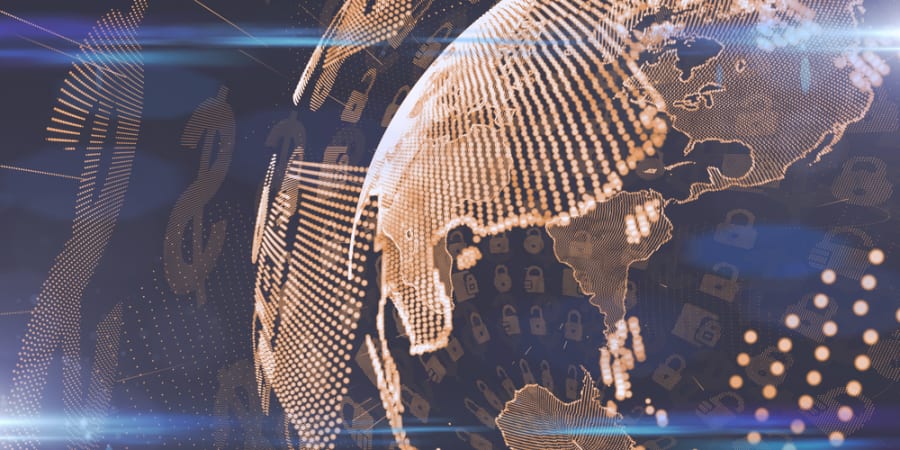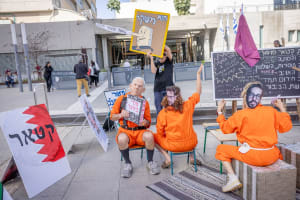DEEP FAKE OF WORDS: A possible connection between WEF's "global democracy", judicial reforms and digital currencies?

It wasn’t until a couple of months ago that I became familiar with the term “deep fake.” Defined as “a video of a person in which their face or body has been digitally altered so that they appear to be someone else, typically used maliciously,” (Dictionary.com) it has now spilled over into the world of words and their meanings.
Once, words served to communicate ideas and concepts which were immediately understood, mostly because everyone used the same definitions for those words. When the phrase "woman" was used, it didn’t mean a man who suddenly identified himself as a female. When you said “terrorist,” it didn’t mean a parent who loudly expressed disgust at a school board meeting.
But similar to the deep fake of people’s identities, words are now being redefined, recaptured and repurposed to create a new understanding that changes any narrative. You just have to be clever and cunning about how you do it.
For example, the word, “Democracy” has been reinvented or reimagined, as they like to say, in order to alter its meaning to something vastly different from its traditional connotation. For most of us, it has always been based upon the fairest and highest achievement of the government, one which fosters the will of the people, giving them the authority to decide how they want to live and conduct their affairs. It has forever been associated with freedom of speech, religion, assembly and equality afforded to everyone, giving each individual the same chance to succeed.
But nowadays, this is vastly different from the new term, “global democracy,” which is being advanced by the WEF (World Economic Forum), basing it on “collaboration,” the concept we’ve known as working together harmoniously. Yet, their definition of collaboration has been repurposed to mean working towards restricting and blocking the rights of others.
Global collaboration, in effect, would be the flexing of muscles by multiple, consenting nations, which see regulation and prohibitions as a great advantage in the ultimate goal of completely dominating and controlling their citizen population.
They know that as one united block, nothing will be unreachable to them. It’s just a matter of getting as many countries on board to promote, and then demand, full obedience to their mutually shared agendas. That’s their definition of “global democracy,” a bit different from that of plain democracy. But with the help of redesigned words, it’s being presented as nations cooperating for the world’s betterment.
But we really don’t have to go that far to witness the effect of words and their meanings when misused to further agendas. Right here in Israel, we are confronted daily by the message of reforms and the great benefits they would have on the country – even ushering in a new prosperity per the claims of our finance minister. They want us to see “reforms” in a positive light, but it all depends on how you define their meaning. The problem is that we may actually not know what these reforms entail until they get passed, and then, it’ll simply be too late.
Part of the problem is that we fail to delve deep enough into the intent of someone’s proposals. It is exactly because we think that we understand the full meaning of the words they are speaking, that we are willing to, almost blindly, accept what is being sold. Yet, not only can words be misleading, but those who are committed to radical change often know that the only way to achieve their goals is by using, what seem to be, otherwise benign words, but which can later morph into disastrous intentions and outcomes which few anticipated.
Yet, this is the hope of many leaders – that somehow, they can exact societal change by using familiar and trusted terminology which will lull people into a sense of well-being, thinking that these shifts and revisions will be a positive thing for them.
But no one should be fooled. Liberties, personal rights and freedoms don’t have to be disguised by clever terms which sound as if they will assure the continuation of what we all hold dear. Freedom is God-given, just like our cherished and long-held values whose meanings are clear and unchanging, as they remain the greatest hope of mankind.
This is why our words must be guarded to retain their intended meaning, because unless we have a genuine understanding of how words are being used and to what end, we are easy prey for disingenuous actors with bad and dishonest motives.
The altering of meanings is nothing more than a deep fake which is nothing more than a disguise in order to hide the true agenda – one which would likely be rejected, and that is why the deep fake must be used in order to avoid reasonable discourse so that details do not emerge.
It’s actually come to that! However, the redefining of words is evidence of weakness, because it is only when a plan is faulty and undesirable that it must be obscured to the point that it becomes unrecognizable. If leaders thought that their initiatives would be met with welcomed acceptance, they would be able to introduce their ambitions with honesty and clarity.
But it’s not just the redefining of words and meanings that is problematic. It is the wholly dishonest dissemination of fabricated facts that is, in large part, responsible for so many of the lies that are pushed as truth, but which, in the end, will surely lead to loss of freedoms.
A perfect example of this is the imminent change to CBDC (Central Banking Digital Currency), which is being promoted as the most convenient and effective way to transact business in the future. They claim that by replacing our faulty currency, we will be able to buy and sell with the greatest ease. Ironically, even the most renowned financial experts have warned that the lack of privacy, resulting from the accompanying blockchain system – viewable, recorded documentation of each individual’s transactions, is riddled with potential problems. Nor is there any discussion as to whether accessing one’s money, at will, is guaranteed, unlike China’s social credit system, which demands certain compliance in order to have the privilege of using your own money.
This is just one type of dishonest communication, short on facts and details which we are supposed to willingly accept as a great advancement.
The reshaping of words and meanings is a very useful propaganda tool in redefining life. But it’s fraudulent, lacking a full context and a comprehensive explanation. The sooner we come to understand its manipulative nature, the closer we will listen to the words that are being spoken – demanding that everything is spelled out clearly so that we are not the victims of a deep fake!

A former Jerusalem elementary and middle-school principal who made Aliyah in 1993 and became a member of Kibbutz Reim but now lives in the center of the country with her husband. She is the author of Mistake-Proof Parenting, based on the principles from the book of Proverbs - available on Amazon.













